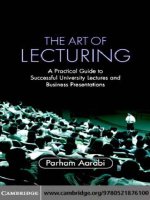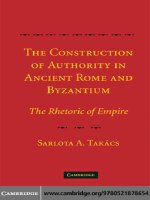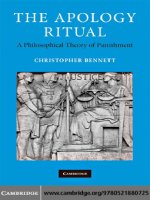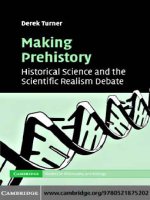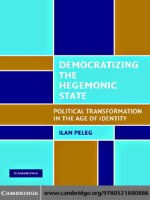cambridge university press god and the reach of reason c s lewis david hume and bertrand russell sep 2007 kho tài liệu bách khoa
Bạn đang xem bản rút gọn của tài liệu. Xem và tải ngay bản đầy đủ của tài liệu tại đây (1.29 MB, 255 trang )
P1: KNP
9780521880862pre
CUNY1074/Wielenberg
978 0 521 88086 2
This page intentionally left blank
i
July 25, 2007
15:3
P1: KNP
9780521880862pre
CUNY1074/Wielenberg
978 0 521 88086 2
July 25, 2007
GOD AND THE REACH OF REASON
C. S. Lewis is one of the most beloved Christian apologists of the twentieth
century; David Hume and Bertrand Russell are among Christianity’s most
important critics. This book puts these three intellectual giants in conversation with one another to shed light on some of life’s most difficult yet
important questions. It examines their views on a variety of topics, including the existence of God, suffering, morality, reason, joy, miracles, and faith.
Along with irreconcilable differences and points of tension, some surprising
areas of agreement emerge. Today, amid the often shrill and vapid exchanges
between “new atheists” and twenty-first-century believers, curious readers
will find penetrating insights in the reasoned dialogue of these three great
thinkers.
Erik J. Wielenberg teaches in the Philosophy Department at DePauw University. He is the author of Value and Virtue in a Godless Universe (2005) published
by Cambridge University Press.
i
15:3
P1: KNP
9780521880862pre
CUNY1074/Wielenberg
978 0 521 88086 2
ii
July 25, 2007
15:3
P1: KNP
9780521880862pre
CUNY1074/Wielenberg
978 0 521 88086 2
GOD AND THE REACH
OF REASON
C. S. Lewis, David Hume, and Bertrand Russell
ERIK J. WIELENBERG
DePauw University
iii
July 25, 2007
15:3
CAMBRIDGE UNIVERSITY PRESS
Cambridge, New York, Melbourne, Madrid, Cape Town, Singapore, São Paulo
Cambridge University Press
The Edinburgh Building, Cambridge CB2 8RU, UK
Published in the United States of America by Cambridge University Press, New York
www.cambridge.org
Information on this title: www.cambridge.org/9780521880862
© Erik J. Wielenberg 2008
This publication is in copyright. Subject to statutory exception and to the provision of
relevant collective licensing agreements, no reproduction of any part may take place
without the written permission of Cambridge University Press.
First published in print format 2007
eBook (EBL)
ISBN-13 978-0-511-35474-8
ISBN-10 0-511-35474-6
eBook (EBL)
hardback
ISBN-13 978-0-521-88086-2
hardback
ISBN-10 0-521-88086-6
paperback
ISBN-13 978-0-521-70710-7
paperback
ISBN-10 0-521-70710-2
Cambridge University Press has no responsibility for the persistence or accuracy of urls
for external or third-party internet websites referred to in this publication, and does not
guarantee that any content on such websites is, or will remain, accurate or appropriate.
P1: KNP
9780521880862pre
CUNY1074/Wielenberg
978 0 521 88086 2
For Jake and Henry
v
July 25, 2007
15:3
P1: KNP
9780521880862pre
CUNY1074/Wielenberg
978 0 521 88086 2
July 25, 2007
[T]here is evidence both for and against the Christian proposition which fully rational minds, working honestly, can assess
differently.
– C. S. Lewis (1955)
vi
15:3
P1: KNP
9780521880862pre
CUNY1074/Wielenberg
978 0 521 88086 2
July 25, 2007
CONTENTS
Acknowledgments
page ix
Introduction
1
1. The Love of God and the Suffering of Humanity
1.1 The Problem
1.2 Hume’s Presentation of the Problem
1.3 Lewis’s Attempt to Solve the Problem
1.4 The Case of Ivan Ilyich
1.5 The Incompleteness of Lewis’s Solution
1.6 Conclusion
7
7
8
16
35
40
52
2. Beyond Nature
2.1 Introduction
2.2 The Moral Argument
2.3 The Argument from Reason
2.4 The Argument from Desire
2.5 Conclusion
56
56
59
93
108
119
3. Miracles
3.1 Introduction
3.2 Debating Miracles in the Eighteenth Century
3.3 A Preliminary Skirmish
3.4 Hume’s Main Assault
3.5 Lewis’s Counterattack
3.6 The Fitness of the Incarnation
121
121
122
124
126
134
143
vii
15:3
P1: KNP
9780521880862pre
CUNY1074/Wielenberg
978 0 521 88086 2
July 25, 2007
Contents
3.7 Lewis’s Mitigated Victory and the Trilemma
3.8 Conclusion
146
152
4. Faith, Design, and True Religion
4.1 Introduction
4.2 Faith
4.3 Design
4.4 True Religion
153
153
153
169
187
Notes
References
Index
203
233
241
viii
15:3
P1: KNP
9780521880862pre
CUNY1074/Wielenberg
978 0 521 88086 2
July 25, 2007
ACKNOWLEDGMENTS
I have acquired many debts of gratitude in writing this book and
thinking about the issues discussed here. The seeds of the book were
planted as I prepared to teach a first-year seminar at DePauw University in the fall of 2002. That seminar sought to introduce students
to philosophy through the works of C. S. Lewis, and I selected Hume
and Russell as the major figures to set in opposition to Lewis. I am
grateful to the students in that course, as well as to those who took a
modified version of the same course in the fall of 2004. Preliminary
versions of some of the ideas in this book were presented at a Faculty
Research Colloquium at DePauw on November 22, 2002, under the
title “C. S. Lewis vs. the Atheists”; I am grateful to the audience for
the feedback I received on that occasion. Other material was presented at a meeting of the Bertrand Russell Society at the Central
APA meeting in Chicago on April 27, 2006, under the title “Bertrand
Russell and C. S. Lewis: Two Peas in a Pod?” I thank the audience
on that occasion for their helpful comments. The production of the
initial draft of the book was done with the help of a pre-tenure leave
from DePauw in the spring of 2005, and revision of the manuscript
was supported by a DePauw Summer Stipend during the summer of
2006.
Many people read some or all of the various earlier versions of
the book and provided helpful comments and criticism. Two anonymous readers for Cambridge University Press produced extensive and
helpful reports; the final version of the book is significantly improved
because of these excellent reports. One of these initially anonymous
ix
15:3
P1: KNP
9780521880862pre
CUNY1074/Wielenberg
978 0 521 88086 2
July 25, 2007
Acknowledgments
readers has subsequently been revealed to be Victor Reppert; the
other remains anonymous (to me). Andy Beck, my editor at Cambridge, was extremely supportive of the project and nudged things
in the right direction at crucial junctures. Daniel Story read a complete early version of the manuscript as part of an independent study
course on the works of C. S. Lewis during the fall of 2005. I am also
grateful to Girard Brenneman, Richard Cameron, Trent Dougherty,
Jennifer Everett, Billy Lauinger, Luke Maring, Mark Murphy, James
Olsen, Alexander Pruss, Karen Stohr, and William Vallicella for their
comments on various parts of the manuscript. Steve Lovell was kind
enough to share with me his dissertation on the philosophical works
of C. S. Lewis; the debt I owe to Lovell will be obvious to the reader
of my own efforts to grapple with Lewis’s ideas. I am confident that
nearly everyone mentioned in this paragraph disagrees with some
of the material in the book; unsurprisingly, I owe the greatest debts
to my most challenging critics.
DePauw University constitutes a stimulating and supportive environment in which I am free to pursue my research interests, wherever they may take me. I am grateful to my colleagues in the Philosophy Department and to the students who have taken my courses for
being a big part of this environment. I am also grateful to the faculty
in the Department of Philosophy at the University of Massachusetts
at Amherst from 1994 to 2000, particularly my dissertation director,
Fred Feldman, for the excellent training in philosophy they provided.
Finally, I thank my mother, Peggy Wielenberg, and my wife,
Margaret, for various kinds of support too numerous to describe.
Without their support, none of this would have been possible. As
always, responsibility for the errors that this work assuredly contains resides ultimately with me.
Greencastle, Indiana
January 2007
x
15:3
P1: KNP
9780521880862int
CUNY1074/Wielenberg
978 0 521 88086 2
July 25, 2007
INTRODUCTION
Plato tells us that Socrates, facing execution in 399 B.C., declared that
“the one aim of those who practice philosophy in the proper manner
is to practice for dying and death.”1 Writing nearly two thousand
years later, Michel de Montaigne remarked that “all the wisdom and
reasoning in the world boils down finally to this point: to teach us
not to be afraid to die.”2
If the measure of a philosopher is the ability to face death without fear, then Clive Staples Lewis (1898–1963), David Hume (1711–
1776), and Bertrand Russell (1872–1970) were great philosophers
indeed. In the penultimate paragraph of his brief autobiography, “My
Own Life,” David Hume relates that he has been “struck with a Disorder in my Bowels” which has “become mortal and incurable.”3 He
remarks on his state of mind as follows:
I have suffered very little pain from my Disorder; and what is more
strange, have, notwithstanding the great Decline of my Person, never
suffered a Moments Abatement of my Spirits: Insomuch, that were I
to name the Period of my Life which I [should] most choose to pass
over again I might be tempted to point to this later Period.4
Samuel Johnson’s biographer James Boswell was simultaneously fascinated and horrified by Hume’s calm acceptance of his own impending death. This was because Boswell knew that Hume did not believe
in an afterlife. Boswell visited Hume repeatedly while Hume was on
his deathbed, questioning him on the topic of annihilation. Hume’s
death on August 25, 1776, sent Boswell into “a mental crisis during
1
15:6
P1: KNP
9780521880862int
CUNY1074/Wielenberg
978 0 521 88086 2
July 25, 2007
God and the Reach of Reason
which he sounded the depths of moral degradation.”5 Hume’s death,
it seems, was harder on Boswell than it was on Hume.
C. S. Lewis also faced impending death as a result of poor health,
and in one of his last letters he expressed sentiments remarkably
similar to those expressed by Hume: “Yes, autumn is really the best
of the seasons; and I’m not sure that old age isn’t the best part of
life.”6 Lewis’s brother reports that Lewis faced death “bravely and
calmly,” at one point remarking, “I have done all I wanted to do, and
I’m ready to go.”7 Lewis died peacefully on November 22, 1963; his
death was overshadowed in the press by the assassination of John F.
Kennedy on the same day.8
Bertrand Russell was by far the most politically active of the three
thinkers who are the focus of this book. He wrote letters and articles,
gave speeches, started a school, won the Nobel Prize for Literature,
and spent time in prison, including six months in 1918 for writing an
antiwar article. His activism was triggered by the outbreak of the first
World War in 1914, an event that, according to Russell, shattered the
“Victorian optimism” that had been taken for granted when he was
a young man.9
In the Postscript to his autobiography, Russell reflected on his long
life, remarking that “[m]y work is near its end, and the time has
come when I can survey it as a whole.”10 Assessing his life, Russell
noted both failures and victories. But his final remarks indicate an
underlying optimism:
I have lived in the pursuit of a vision, both personal and social.
Personal: to care for what is noble, for what is beautiful, for what is
gentle: to allow moments of insight to give wisdom at more mundane
times. Social: to see in imagination the society that is to be created,
where individuals grow freely, and where hate and greed and envy
die because there is nothing to nourish them. These things I believe,
and the world, for all its horrors, has left me unshaken.11
Russell’s pursuit of a personal and social vision seems to have sustained him in his old age as death loomed, in much the way he
described in an essay called “How to Grow Old”:
2
15:6
P1: KNP
9780521880862int
CUNY1074/Wielenberg
978 0 521 88086 2
July 25, 2007
Introduction
An individual human existence should be like a river – small at first,
narrowly contained within its banks, and rushing passionately past
boulders and over waterfalls. Gradually the river grows wider, the
banks recede, the waters flow more quietly, and in the end, without
any visible break, they become merged in the sea, and painlessly lose
their individual being. The man who, in old age, can see his life in this
way, will not suffer from the fear of death, since the things he cares
for will continue.12
One feature common to the deaths of Hume, Lewis, and Russell is
that they were philosophical deaths. By this I mean that each thinker
faced his death armed with a comprehensive view about the nature
of human beings and their place in the universe that had been carefully developed and considered over a long period of time. Yet these
worldviews were quite different from one another. Lewis’s view was
a fairly traditional version of Christianity, centered on a personal God
who created, loves, and interacts with human beings. Hume and
Russell both rejected the notion of a personal, loving God, admitting at best a distant, largely unknowable Deity that does not fiddle
about in human affairs. Lewis saw our earthly lives as merely a tiny
(but important) fraction of our overall existence, whereas Hume and
Russell viewed such lives as all we get. Interestingly, Lewis spent
many years in the Hume–Russell camp (broadly speaking) before
converting to Christianity in his early thirties.
Lewis, Hume, and Russell were (among other things) philosophers, and each offered arguments for his own worldview and against
competing views. This book is a philosophical examination of some
of these arguments, with a particular emphasis on those of Lewis.
This book is about suffering, morality, reason, joy, miracles, faith,
and God. It is about the views of three great thinkers on deep and
important topics.
Hume and Russell are giants in the Western philosophical tradition. Hume’s work Dialogues Concerning Natural Religion is widely
considered one of the most important works in the philosophy of
religion in the Western tradition. In the introduction to a recent book
devoted to examining critically Hume’s views on religion, the editors
3
15:6
P1: KNP
9780521880862int
CUNY1074/Wielenberg
978 0 521 88086 2
July 25, 2007
God and the Reach of Reason
observe that “from his day to ours, the vast majority of philosophical
attacks against the rationality of theism have borne an unmistakable Humean aroma.”13 Russell’s place in the pantheon of Western
philosophers is similarly well established, though his reputation for
greatness is due more to his contributions in logic and the philosophy of mathematics than to his work in the philosophy of religion. Lewis’s case, however, is somewhat different; while his works
of fiction and Christian apologetics are widely read and adored, his
writing has been largely (but not entirely) ignored by contemporary philosophers. Or at least, his Christian writing has received relatively little attention from professional philosophers in their professional capacity. This is despite ample evidence that contemporary
Christian philosophers are familiar with Lewis’s work and, indeed,
that some have been dramatically influenced by it. For instance, the
prominent contemporary Christian philosopher Peter van Inwagen
writes that “[l]ike many other people, I first discovered what Christianity was from reading Lewis.”14 He goes on to say that it was
through Lewis that he first saw that “Christianity was a serious thing
and intellectually at a very high level.”15 Whatever the reason for
the relative neglect of Lewis in contemporary philosophy, I believe
that it is a mistake, and one of my aims in this book is to show that
Lewis’s philosophical work is worthy of serious attention.
Here is a brief overview of what is to come. The first chapter
focuses on the challenge that suffering poses for belief in God as
that challenge is formulated by Hume in Dialogues Concerning Natural
Religion and addressed by Lewis in The Problem of Pain. I argue that
while Lewis’s response to the challenge is incomplete in a certain
way, that response is novel and has a richness and subtlety that has
not been widely appreciated. I seek to bring out this richness by
defending Lewis’s solution to the problem of pain against a variety
of objections.
Chapter 2 focuses on Lewis’s three main arguments for the existence of a Higher Power. These arguments are grounded in human
nature. Like Descartes, Lewis thinks that we can understand God by
first understanding ourselves. He maintains that human beings have
knowledge of objective moral truths, can reason, and have a desire
4
15:6
P1: KNP
9780521880862int
CUNY1074/Wielenberg
978 0 521 88086 2
July 25, 2007
Introduction
that nothing on earth can satisfy. Each of these aspects of human
nature constitutes the starting point of an argument for the existence
of a Higher Power. Hume and Russell appear in this chapter primarily
as critics of Lewis’s theistic arguments. I suggest, however, that some
of the most serious challenges to Lewis’s arguments come from the
relatively new field of evolutionary psychology, and I explain how
evolutionary psychology may be drawn upon to resist Lewis’s case
for a Higher Power.
The third chapter is like the first in that it focuses on a challenge
posed by Hume together with a direct response to that challenge
from Lewis. In this case the focus is on miracles and testimony. Hume
argues, roughly, that testimony (of a certain kind) never provides us
with a good reason to believe that a miracle has taken place. An
obvious implication of this result is that it would not be reasonable
for us to believe that the Resurrection of Christ really happened
on the basis of the New Testament gospels; thus, Hume’s argument
strikes directly at the heart of Christianity. Lewis criticizes Hume’s
argument and tries to show that the Resurrection has enough initial
plausibility that testimony could provide sufficient evidence for its
occurrence. After carefully explaining the reasoning of Hume and
Lewis on these issues, I make the case that while Lewis exposes a
significant weakness in Hume’s argument, Lewis’s own argument
fails because it depends upon his case for the existence of a Higher
Power, and this case is not particularly strong (as I argue in Chapter 2). The chapter concludes with a discussion of the implications
of all of this for Lewis’s famous “Trilemma.”
Chapter 4 involves more exposition than the preceding three
chapters and focuses on some perhaps surprising areas of agreement
among the three thinkers. Substantial attention is devoted to determining Hume’s overall views on religion, particularly in Dialogues
Concerning Natural Religion. I argue that despite their very different
positions on the status of Christianity, the three thinkers hold similar
views on the importance of following the evidence and on the difficulties humans face in doing this. I further argue that all three reject
the argument from design and recognize the potential for violence
of organized religion. Hume and Russell favor the abandonment of
5
15:6
P1: KNP
9780521880862int
CUNY1074/Wielenberg
978 0 521 88086 2
July 25, 2007
God and the Reach of Reason
traditional dogma (including Christian dogma) as the way to avoid
religious violence, whereas Lewis maintains that the solution to the
problem lies in a proper understanding of Christianity itself.
Lewis receives the most attention in this book, with Hume a close
second and Russell a distant third. This is not because I think Lewis’s
conclusions are correct; as the preceding outline of the book should
make clear, I think that Lewis’s overall case for Christianity fails. My
main goal here is to put these three great thinkers in conversation
with each other, shedding light not only on the views of each but
also on the quality of their various arguments. It is in part because I
believe that Lewis’s views have received the least serious philosophical treatment of the three that I give those views the most attention
here. But this book is not just for those interested in Lewis, Hume, or
Russell; it is for anyone interested in thinking seriously and thinking
hard about God. We study great thinkers not just to learn about them
but also to learn from them. As Lewis said in a different context: “The
silly things these great men say, were as silly then as they are now:
the wise ones are as wise now as they were then.”16
We begin with suffering.
6
15:6
P1: KNP
9780521880862c01
CUNY1074/Wielenberg
978 0 521 88086 2
July 25, 2007
ONE
THE LOVE OF GOD AND THE SUFFERING
OF HUMANITY
1.1 THE PROBLEM
On Sunday, December 26, 2004, an earthquake off the western coast
of Indonesia‘s Sumatra Island triggered a massive tsunami that subsequently struck several countries, killing over 200,000 people. The
hardest-hit countries included Indonesia, Thailand, Sri Lanka, and
India. The tsunami struck with little or no warning. Entire villages
were wiped from the face of the earth, and whole families were swept
out to sea. The casualties were so overwhelming that little attempt
was made to identify most of the corpses. Instead, they were buried
as quickly as possible in mass graves.
In the aftermath of the disaster, one of the topics to which the
popular media turned its attention was the problem of evil, a problem that philosophers and theologians have thought about for over
two millennia. The problem of evil is often posed as a question: If
there is an all-powerful, all-knowing, and perfectly good God, then
why does the world contain the assorted evils that it does? The problem may be posed more aggressively as a challenge: If there were an
all-powerful, all-knowing, and perfectly good God, then the world
wouldn’t contain the assorted evils that it does. Hence, no such God
exists. A one-page article in the January 10, 2005, issue of Newsweek
titled “Countless Souls Cry Out to God” hinted that the tsunami disaster constituted evidence that such a God does not exist, ending
with these lines:
Whole families, whole communities, countless pasts and futures have
been obliterated by this tsunami’s roiling force. Little wonder that
7
15:10
P1: KNP
9780521880862c01
CUNY1074/Wielenberg
978 0 521 88086 2
July 25, 2007
God and the Reach of Reason
from Sumatra to Madagascar, innumerable voices cry out to God. The
miracle, if there is one, may be that so many still believe.1
The 2004 tsunami is not without precedent. On November 1, 1755,
an earthquake struck the Portuguese city of Lisbon, one of the largest
and most beautiful cities in Europe at the time. This quake, like the
one off the coast of Sumatra Island, was followed by large tsunamis
as well as widespread fires that burned for days. More than 100,000
people lost their lives as a result of the Lisbon earthquake.
The earthquake was featured in Voltaire‘s satirical 1759 work
Candide, which recounts the misadventures of Candide and his companion Pangloss. The latter is a philosopher who consistently maintains that ours is the best of all possible worlds, despite the various
horrors the two experience.2 The fictional Pangloss represents the
actual philosopher Leibniz, who really did maintain that ours is the
best of all possible worlds.3 Voltaire means to illustrate the absurdity
of this proposition in Candide, and the Lisbon earthquake is offered
as evidence in that regard. Leibniz thought that ours must be the
best of all possible worlds because a perfect God must create the best
of all possible worlds. So Voltaire’s ridicule of the Leibnizian claim
that this is the best of all possible worlds may ultimately be seen as
ridicule of the idea that a perfect God exists.
Hume and Lewis both grappled with the problem of evil.4 Lewis’s
first book of Christian apologetics, The Problem of Pain, is devoted
to dealing with the problem, and Lewis’s discussion there is pretty
clearly a direct response to Hume’s presentation of the problem in
Parts X and XI of his Dialogues Concerning Natural Religion. While it
is Lewis’s attempt to solve the problem of evil that is the focus of
this chapter, it is helpful first to examine Hume’s presentation of the
problem.
1.2 HUME’S PRESENTATION OF THE PROBLEM
Hume worked on the Dialogues Concerning Natural Religion off and
on over a period of almost thirty years. At the urging of his friends,
many of whom read a draft of the work in the early 1750s, Hume
8
15:10
P1: KNP
9780521880862c01
CUNY1074/Wielenberg
978 0 521 88086 2
July 25, 2007
The Love of God and the Suffering of Humanity
did not publish it during his lifetime. His friends feared that because
of the controversial nature of the Dialogues, publication would have
a detrimental effect on Hume’s life and reputation. Hume had good
reason to take his friends’ advice seriously. The writing on religion
that Hume did publish during his lifetime drew the ire of many of
his religious contemporaries. As a consequence of his writing on
religion he was denied the chair of logic at Glasgow University in
1752, and about five years later the Church of Scotland attempted
to excommunicate him.5 Nevertheless, Hume specified in his will
that the Dialogues be published posthumously, and it first appeared
in print in 1779, three years after his death.6
The Dialogues is an extended conversation among three characters, Cleanthes, Philo, and Demea, as reported by Cleanthes’s student, Pamphilus, to Pamphilus’s companion Hermippus. As the title
suggests, the topic of the discussion is natural religion – religion based
on human reason alone, without the aid of divine revelation or
other supernatural activity. Much of the conversation focuses on
what human reason alone can determine about the existence and
nature of God. Each of the three main characters has a distinct view
on these issues, and one of them, Philo, goes so far as to question the
existence of God altogether. Presumably this is at least part of what
made the work so controversial in the eyes of Hume’s friends.
Ascertaining Hume’s own views on the basis of the Dialogues is
a tricky business. In particular, there has been much debate over
whether any one of the three characters speaks for Hume and, if so,
which one. One popular view has been that Philo is Hume’s mouthpiece.7 However, even if this is correct, more work is needed to determine just what Hume’s views are, because ascertaining the views of
Philo is itself a less-than-straightforward matter.
In Chapter 4 we will delve into the tricky business of ascertaining
Hume’s own views in the Dialogues, but for the moment we can
safely avoid this task, for the following reasons: In Parts X and XI of
the Dialogues, the problem of evil is raised by Demea and Philo. The
challenge raised here is never satisfactorily answered in the Dialogues
nor, indeed, in any of Hume’s works. This suggests at the very least
that Hume considered the problem of evil to be a serious challenge,
9
15:10
P1: KNP
9780521880862c01
CUNY1074/Wielenberg
978 0 521 88086 2
July 25, 2007
God and the Reach of Reason
one to which he himself had no satisfactory answer. Furthermore,
it is the discussion of the problem of evil in these two sections of
the Dialogues that sets the stage for The Problem of Pain. Our interest,
then, is in understanding the problem as it appears in the Dialogues
and evaluating Lewis’s response to that problem. The question of
Hume’s own view on the problem is one that we can safely set aside,
at least for the moment.
In the parts of the Dialogues preceding Parts X and XI, two types of
arguments for the existence of God are discussed. Cleanthes defends
a type of design argument (dubbed “the argument a posteriori”), and
Demea defends a cosmological argument (dubbed “the argument a
priori”). Philo, playing the role of skeptic, criticizes both arguments,
alternately joining forces with Demea or Cleanthes, depending on
the topic. For the most part, Philo pretends to share the views of
Demea. Although the fact that Philo’s apparent agreement with
Demea is mere pretense is made sufficiently clear both to Cleanthes and to the attentive reader, it is not recognized by Demea until
Part XI.
Having seen his cosmological argument subjected to scathing criticism at the hands of Cleanthes and Philo in Part IX, Demea begins
Part X with a new tack. He suggests that it is a “consciousness of
[their own] imbecility and misery rather than . . . any reasoning” that
drives people to believe in God.8 This suggestion leads Philo to make
the following ironic remark: “I am indeed persuaded . . . that the best
and indeed the only method of bringing everyone to a due sense
of religion is by just representation of the misery and wickedness
of men.”9 While Demea and Philo agree that reflection on human
suffering will lead to a “due sense of religion,” they disagree on just
what this “due sense” is. Demea thinks that such reflection will lead
to awe and submission to God, whereas Philo thinks it will lead to
doubt of the existence of a good God altogether. However, Demea
does not recognize the irony of Philo’s remark, instead taking it as a
straightforward agreement with his own view.
Philo’s remark launches an extended discussion of the assorted
evils of the world. Here is Demea’s colorful description of human
life:
10
15:10
P1: KNP
9780521880862c01
CUNY1074/Wielenberg
978 0 521 88086 2
July 25, 2007
The Love of God and the Suffering of Humanity
The whole earth, believe me, Philo, is cursed and polluted. A perpetual
war is kindled amongst all living creatures. Necessity, hunger, want
stimulate the strong and courageous: fear, anxiety, terror agitate the
weak and infirm. The first entrance into human life gives anguish to
the new-born infant and to its wretched parent: weakness, impotence,
distress attend each stage of that life, and it is, at last, finished in agony
and horror.10
Of particular interest is Philo’s assessment of the philosophical implications of such suffering:
Is the world, considered in general and as it appears to us in this life,
different from what a man or such a limited being would, beforehand,
expect from a very powerful, wise, and benevolent Deity? It must be
strange prejudice to assert the contrary. And from thence I conclude
that, however consistent the world may be, allowing certain suppositions and conjectures with the idea of such a Deity, it can never
afford us an inference concerning his existence. The consistency is not
absolutely denied, only the inference.11
In this passage, Philo seems to suggest that the philosophical significance of the suffering in the world is that it provides the basis
of a decisive objection to Cleanthes’s design argument. Cleanthes
argues that we can infer the existence of God from certain observable features of the world. But the God of traditional monotheism
is omnipotent, omniscient, and morally perfect. Philo’s point is that
the presence of suffering in the world effectively blocks the inference from the observable universe to a morally perfect Creator. But
Philo explicitly refrains from asserting that the presence of suffering
is inconsistent with the existence of such a God. This might lead us
to conclude that Philo’s position is that we cannot infer from the suffering we observe that God does not exist. However, other passages
indicate that such a conclusion would be too hasty. For instance,
earlier in Part X Philo has this to say:
His power, we allow, is infinite; whatever he wills is executed: But
neither man nor any other animal is happy; therefore, he does not
will their happiness. His wisdom is infinite; He is never mistaken in
choosing the means to any end; But the course of nature tends not
to human or animal felicity: Therefore, it is not established for that
11
15:10
P1: KNP
9780521880862c01
CUNY1074/Wielenberg
978 0 521 88086 2
July 25, 2007
God and the Reach of Reason
purpose. Through the whole compass of human knowledge there are
no inferences more certain and infallible than these. In what respect,
then, do his benevolence and mercy resemble the benevolence and
mercy of men?12
In these lines Philo suggests that an omnipotent and omniscient God
would surely have sufficient power and wisdom to make us happy, if
He so desired. Yet we are not happy, so God must not desire our happiness. Philo even goes so far as to remark that no human reasoning
is more certain than this. He then implicitly takes a further step: A
good God would desire our happiness. It follows that there is no God
who is omnipotent, omniscient, and good. It appears that Philo is
suggesting that we can infer the nonexistence of the traditional God
of monotheism from the presence of suffering in the world.
Some remarks Philo makes later in Part XI support this interpretation. Philo introduces “four hypotheses . . . concerning the first causes
of the universe.”13 The four hypotheses are (i) a perfectly good first
cause, (ii) a perfectly evil first cause, (iii) two (joint) first causes, one
perfectly good, the other perfectly evil, and (iv) a morally indifferent first cause. Only the first hypothesis is consistent with traditional
monotheism; the third hypothesis corresponds to Dualism, a view
declared heretical under Christianity and, as we will see, discussed
at some length by Lewis.14
Reflecting on the mixture of good and evil in the universe, Philo
rejects the first two hypotheses, suggesting that it is unlikely that
pure first causes would produce such “mixed phenomena.” He rejects
the third hypothesis on the basis of the “uniformity and steadiness
of general laws” in our universe; the idea seems to be that a cosmic
struggle between good and evil first causes would produce a universe
significantly less orderly than our own. By a process of elimination,
Philo concludes that the fourth hypothesis “seems by far the most
probable.”15
So Philo appears to maintain both (i) that as far as we can tell,
suffering is consistent with the existence of God, and (ii) that we can
infer, on the basis of suffering in the world, that God does not exist.
Does Philo thereby contradict himself? No; (i) and (ii) are compatible.
12
15:10
P1: KNP
9780521880862c01
CUNY1074/Wielenberg
978 0 521 88086 2
July 25, 2007
The Love of God and the Suffering of Humanity
Sometimes it is reasonable to infer not-q from p even though p and
q are logically consistent. Suppose, for instance, that p = tomorrow
you will flip a fair coin exactly one hundred times (and you will
flip no other coins tomorrow) and that q = tomorrow you will flip
“heads” one hundred times. Even though p and q are compatible, I
can reasonably infer not-q from p because p makes q very unlikely.
And Philo’s position seems to be that, while the presence of suffering
in the world may be compatible with the existence of God, it makes
God’s existence unlikely. This is evident from his conclusion that the
fourth hypothesis is “by far the most probable.”
There is one other important wrinkle to Philo‘s position. In Part I
of the Dialogues, Philo registers his misgivings about the feasibility of
natural religion:
[W]hen we carry our speculations into the two eternities, before and
after the present state of things; into the creation and formation of the
universe; the existence and properties of spirits; the powers and operations of one universal Spirit existing without beginning and without
end, omnipotent, omniscient, immutable, infinite, and incomprehensible. We must be far removed from the smallest tendency to skepticism not to be apprehensive that we have here got quite beyond the
reach of our faculties . . . We are like foreigners in a strange country to
whom everything must seem suspicious, and who are in danger every
moment of transgressing against the laws and customs of the people
with whom they live and converse. We know not how far we ought
to trust our vulgar methods of reasoning in such a subject.16
These and other remarks show that Philo‘s discussion of human suffering in Parts X and XI is undertaken in the context of skepticism
about the capacity of human reason to tell us much at all about the
existence and nature of God.
To understand Philo‘s position in its entirety, we need to understand that his main opponent is Cleanthes. Cleanthes maintains that
human reason can tell us quite a bit about the existence and nature
of God, and that what it tells us is that the universe was created
by a powerful, wise, and good God. Philo criticizes both aspects of
Cleanthes’s position, arguing that we shouldn’t put much stock in the
results of human reasoning when it comes to religion – but to the
13
15:10
